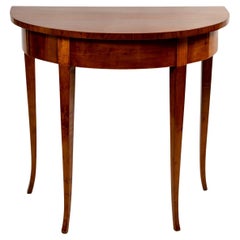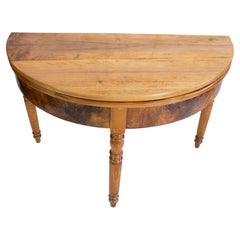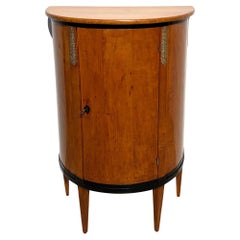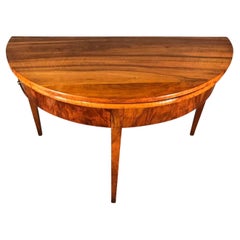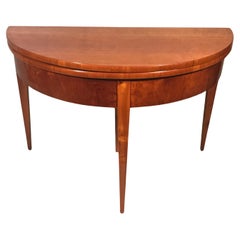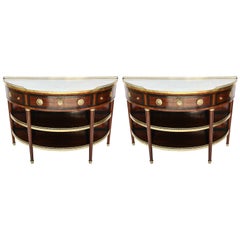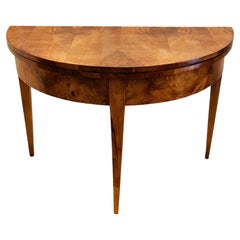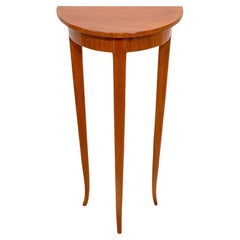Biedermeier Demi-lune Tables
The authentic Biedermeier furniture on 1stDibs is representative of the first modern European decorative style not dictated by the tastes of the aristocracy. Following the Napoleonic wars, a growing, wealthy urban middle class in the German-speaking states of Central Europe began to demand rights and privileges once granted only to nobles. To avoid trouble, the upwardly striving confined their political discussions to one another’s homes. And so the salon was born.
Cabinetmakers in cities such as Vienna, Berlin and Mainz began to offer goods that reflected the tastes and needs of the new class. The makers of Biedermeier chairs, tables and other furniture used little or no gilding, silver hardware or other lavish ornament. Ebonized trims are common on Biedermeier cabinetry, and neoclassical elements — lyre-shaped chair splats, carved scrollwork, table supports shaped like Greek columns. But the strongest aesthetic statement came from the wood — richly-grained, honey-colored, often book-matched veneers of walnut and fruitwood.
There are two iconic Biedermeier furniture forms, both made to outfit rooms designed for conversation. One is the sofa, deeply upholstered with a strong, architectural wooden frame. The second is the circular pedestal table, which stood at the center of the room, offering a surface on which to place coffee and cake services; or to roll out a map, or sketch out ideas on paper.
“Biedermeier” was originally a derogatory term — it derives from the pen names of two German magazine writers who mocked bourgeois manners. Looking at the elegant and refined antique, new and vintage Biedermeier furniture offered on 1stDibs, that is now an amusing irony.
Early 19th Century Austrian Antique Biedermeier Demi-lune Tables
Fruitwood
19th Century German Antique Biedermeier Demi-lune Tables
Walnut
1820s German Antique Biedermeier Demi-lune Tables
Cherry
Early 1800s French Antique Biedermeier Demi-lune Tables
Brass
1810s German Antique Biedermeier Demi-lune Tables
Walnut
1820s German Antique Biedermeier Demi-lune Tables
Cherry
19th Century Dutch Antique Biedermeier Demi-lune Tables
Satinwood
19th Century German Antique Biedermeier Demi-lune Tables
Spruce, Fruitwood
19th Century Austrian Antique Biedermeier Demi-lune Tables
Marble, Gold Leaf
1810s German Antique Biedermeier Demi-lune Tables
Cherry
Early 19th Century French Antique Biedermeier Demi-lune Tables
Carrara Marble, Ormolu
19th Century Swedish Antique Biedermeier Demi-lune Tables
Pine
Early 20th Century French Biedermeier Demi-lune Tables
Walnut
Early 19th Century Spanish Antique Biedermeier Demi-lune Tables
Walnut
1810s Italian Antique Biedermeier Demi-lune Tables
Fir
19th Century Swedish Antique Biedermeier Demi-lune Tables
Pine, Paint
Late 18th Century British Antique Biedermeier Demi-lune Tables
Pine
Early 19th Century Antique Biedermeier Demi-lune Tables
Mahogany
Early 19th Century Antique Biedermeier Demi-lune Tables
Cherry, Softwood
20th Century Biedermeier Demi-lune Tables
Wood
2010s Belgian Biedermeier Demi-lune Tables
Walnut
1810s German Antique Biedermeier Demi-lune Tables
Walnut
19th Century German Antique Biedermeier Demi-lune Tables
Walnut
1830s German Antique Biedermeier Demi-lune Tables
Cherry, Softwood
Early 19th Century German Antique Biedermeier Demi-lune Tables
Cherry
19th Century Austrian Antique Biedermeier Demi-lune Tables
Walnut
1820s Austrian Antique Biedermeier Demi-lune Tables
Marble
19th Century Dutch Antique Biedermeier Demi-lune Tables
Hardwood, Satinwood, Pine, Paint, Wood
1820s German Antique Biedermeier Demi-lune Tables
Cherry, Ebony, Softwood
Early 19th Century Austrian Antique Biedermeier Demi-lune Tables
Brass
Early 19th Century Austrian Antique Biedermeier Demi-lune Tables
Mahogany, Wood
1820s German Antique Biedermeier Demi-lune Tables
Ebony, Maple, Walnut
1810s German Antique Biedermeier Demi-lune Tables
Walnut
19th Century German Antique Biedermeier Demi-lune Tables
Spruce, Cherry
